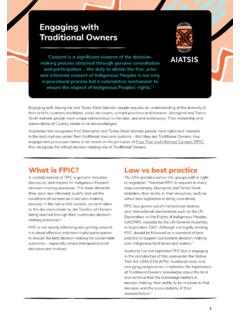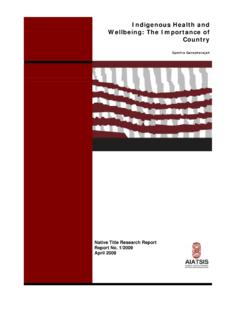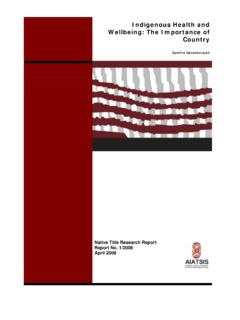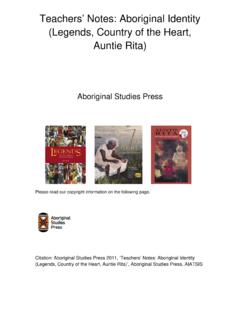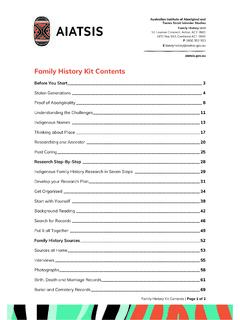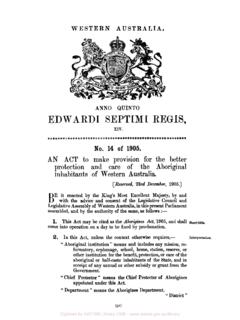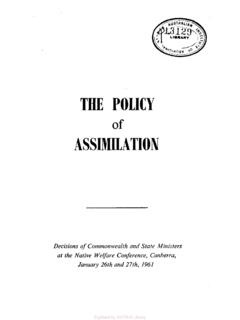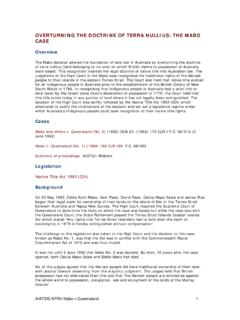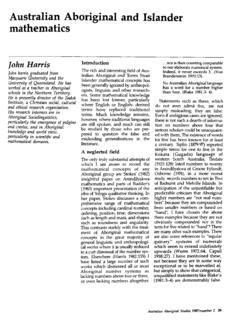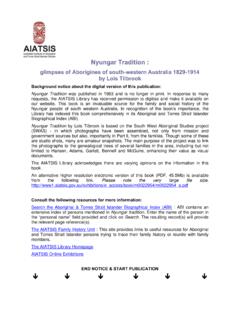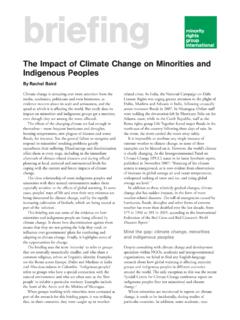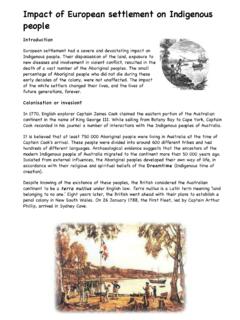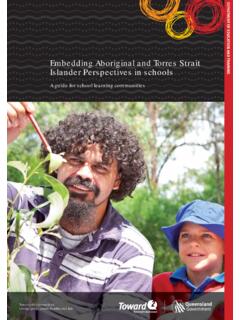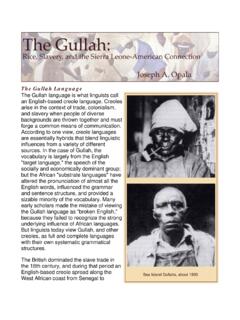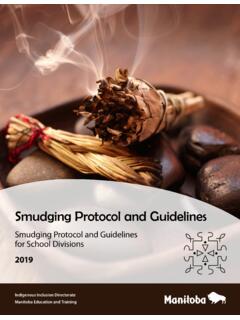Transcription of AIATSIS Code of Ethics for Aboriginal and Torres Strait ...
1 AIATSIS Code of Ethics for Aboriginal and Torres Strait Islander Research Warning: Aboriginal and Torres Strait Islander readers should be aware that this document may contain sensitive information, images or names of people who have since passed away. First published in 2020 by Australian Institute of Aboriginal and Torres Strait Islander Studies ( AIATSIS ). Copyright AIATSIS . All rights reserved. Apart from any fair dealing for the purpose of private study, research, criticism or review, as permitted under the Copyright Act 1968 (the Act), no part of this paper may be reproduced or transmitted in any form or by any means, electronic or mechanical, including photocopying, recording or by any information storage and retrieval system, without prior permission in writing from the publisher.
2 The Act also allows a maximum of one chapter or 10 per cent of this paper, whichever is the greater, to be photocopied or distributed digitally by any educational institution for its educational purposes, provided the educational institution (or body that administers it) has given a remuneration notice to Copyright Agency Limited (CAL) under the Act. Australian Institute of Aboriginal and Torres Strait Islander Studies ( AIATSIS ). GPO Box 553, Canberra ACT 2601. Phone 61 2 6246 1111. Email ISBN (ePDF): 9781925302363. The AIATSIS logo is derived from the Koko Bera-Kungen Shield created by George Wilson, Claude Ponto and John William Malcolm. The logo was first published by the Institute's Council in 1963.
3 Today, AIATSIS . continues to work with the families of the creators to develop the story of the shield. The featured artwork is by Kamilaroi artist Leah Brideson and was commissioned for the AIATSIS Code of Ethics for Aboriginal and Torres Strait Islander Research. Leah is a descendent of the Kamilaroi people from the Gunnedah region. Leah is a self-taught Aboriginal artist who creates Visual Yarns' or stories through her paintings, in which are inspired from her Country, her family history, her culture and the local landscape. Leah also works for the ACT Education Directorate as a Cultural Integrity Coordinator, supporting schools and teachers to embed Aboriginal and Torres Strait Islander cultures in the curriculum whilst using art as a platform to share her culture and educate the wider community.
4 The artwork is now part of the AIATSIS Collection. Title: Warranggal Baynyi ( strong ripple' in Gamilaraay language ). This piece represents a strong ripple of perspectives, relationships and knowledge in Aboriginal and Torres Strait Islander research. Encompassing the central principal of integrity, the open pathways of understanding, respect, relationship building and reciprocity connect the four principles of leadership, self-determination, impact and value and sustainability and accountability (four outer circles). All concepts within this piece are interconnected with the relationship Aboriginal and Torres Strait Islander people have with the land, water and sky and holistically acknowledges our strengths, knowledge, beneficence and cultural integrity.
5 Contents Executive summary 2. Introduction 3. Purpose 3. Structure 3. Why a new code? 4. The relationship of this code to other national standards 4. When does the AIATSIS Code apply? 5. What is Aboriginal and Torres Strait Islander research? 6. Who should use the AIATSIS Code? 6. When is ethical review required? 7. The AIATSIS research Ethics framework 9. The ethical foundations 11. The Principles 12. Principle 1 indigenous self-determination 12. Principle 2 indigenous leadership 17. Principle 3 Impact and value 20. Principle 4 Sustainability and accountability 21. List of definitions 24. References and resources 25. Executive summary The Australian Institute of Aboriginal and Torres Strait Islander Studies ( AIATSIS ) Code of Ethics for Aboriginal and Torres Strait Islander Research is informed by the recognition of and respect for the rights of Indigenous1 peoples as articulated in the United Nations Declaration on the Rights of indigenous As such, AIATSIS recognises that Aboriginal and Torres Strait Islander peoples have the right to be fully engaged in any processes, projects and activities that may impact on them.
6 The AIATSIS Code outlines four principles that underpin ethical Australian indigenous research; these are: indigenous self-determination, indigenous leadership, impact and value, and sustainability and accountability. Each principle frames a set of responsibilities for researchers, institutions and review bodies when conducting Aboriginal and Torres Strait Islander research. Aboriginal and Torres Strait Islander research includes all research that impacts on or is of particular significance to Aboriginal and Torres Strait Islander peoples, including the planning, collection, analysis and dissemination of information or knowledge, in any format or medium, which is about, or may affect, indigenous peoples, either collectively or individually.
7 The AIATSIS Code sets national standards for the ethical and responsible conduct of all Aboriginal and Torres Strait Islander research, across all disciplines and methodologies. It is for use by those undertaking research, reviewing research or funding research, including individuals, universities, governments, industry and community organisations. This Code is consistent with and supports the Australian Code for the Responsible Conduct of Research and the National Statement on Ethical Conduct in Human It provides guidance on the application of those standards in Aboriginal and Torres Strait Islander research. The AIATSIS Code is issued pursuant to AIATSIS ' legislative function to provide leadership in Ethics .
8 Compliance with this Code is required for all research funded by or undertaken under the auspices of AIATSIS , the Australian Research Council (ARC) and the National Health and Medical Research Council (NHMRC), and other institutions or bodies that have adopted the AIATSIS Code. 1 The term indigenous ' refers to both Aboriginal and Torres Strait Islander. 2 3 ; conduct-human-research-2007-updated-2018 . AIATSIS Code of Ethics for Aboriginal and Torres Strait Islander Research 2. Introduction Purpose The purpose of the AIATSIS Code of Ethics for Aboriginal and Torres Strait Islander Research (the AIATSIS Code or this Code) is to promote ethical and responsible practice in Aboriginal and Torres Strait Islander research in Australia, to increase the contribution of indigenous knowledge to Australian research, to ensure research has a positive impact for Aboriginal and Torres Strait Islander peoples, and to continuously improve the quality and standards of research in this area.
9 The principles in this Code are informed by the recognition of and respect for the rights of indigenous peoples as articulated in the United Nations Declaration on the Rights of indigenous As such, we recognise that Aboriginal and Torres Strait Islander peoples have the right to be fully engaged in any processes, projects and activities that may impact them. The AIATSIS Code recognises that indigenous peoples have the right to control and maintain their culture and heritage, and that means benefiting from research undertaken by, with and about them. The establishment of written guidelines for research conduct not only ensures that the expectations and standards of practice are clearly understood and shared, but also assists in building Aboriginal and Torres Strait Islander peoples' confidence in the research community and its practices.
10 The Australian Institute of Aboriginal and Torres Strait Islander Studies Act 1989 (Cth) requires AIATSIS . to provide leadership in Ethics and protocols for research and activities relating to collections about Aboriginal and Torres Strait Islander AIATSIS is the sole Commonwealth body with these responsibilities and this Code is issued pursuant to that legislated function. Structure The AIATSIS Code is structured according to four principles that underpin ethical and responsible Aboriginal and Torres Strait Islander research, which are: 1. indigenous self-determination 2. indigenous leadership 3. Impact and value 4. Sustainability and accountability. Each principle includes a set of responsibilities for conducting Aboriginal and Torres Strait Islander research.
